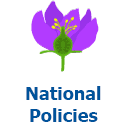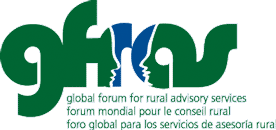 Every country has developed, formulated, and decreed national policies related to rural advisory services. Find some examples here. If you are looking for a national policy from a specific country, please use the search function, selecting the category “National policies” and the tag for the country.
Every country has developed, formulated, and decreed national policies related to rural advisory services. Find some examples here. If you are looking for a national policy from a specific country, please use the search function, selecting the category “National policies” and the tag for the country.

Reviews and Assessments (32)
Global Review of Good Agricultural Extension and Advisory Service Practices
Written by Ingrid OliveiraThe perceived lack of success of public agricultural extension systems in many countries has resulted in new approaches being tried in reorganizing extension services. In some countries, such as India and China, public extension systems have been decentralized to the district/county level and these public extension systems are now pursuing a more market-driven approach. In other countries, different models have been tried, involving both private-sector firms and civil society organizations (CSOs), in an attempt to find more effective approaches of providing basic extension services. Also, in some countries, there have been attempts to shift more of the cost of extension services to the farmers themselves, with limited success. This paper provides a framework for analyzing the success or failure of different approaches within the agricultural development process in providing particular extension services to different categories of farmers.
Whose Job Is It? Integrating Agriculture and Nutrition in Public Sector Agricultural Extension Services
Written by Ingrid OliveiraNutrition-sensitive agriculture (Box 1) has the attention and is increasingly promoted by national governments and the global development community. This is exemplified in Feed the Future (FTF), the U.S. Government’s initiative to sustainably reduce global hunger and poverty. It is embodied in FTF’s twin objectives: inclusive agricultural sector growth and improved nutritional status especially of women and children. Nutrition-sensitive agriculture is a means towards achieving these objectives (Ruel, Alderman, & the Maternal Child and Nutrition Study Group, 2013).
Improving the Nutritional Impact of Extension Services in Rural Africa
Written by Ingrid OliveiraExperience in nutrition interventions points to several design characteristics of field programmes which could improve their effectiveness. Regular government extension services have the potential to reach large numbers of people, yet staff will require additional training to respond to the changing demands of field work. A new approach to training such staff has been developed by the Food and Agriculture Organization. The approach provides staff with information and managerial skills that are common to all extension work. The practical examples used to introduce these techniques illustrate nutritional problems that fieldworkers face and give a measure of confidence in finding solutions. Training materials based on this approach are presently used by several governments.
Nutrition-Sensitive Agriculture What Have We Learned and Where Do We Go from Here?
Written by Ingrid OliveiraA growing number of governments, donor agencies, and development organizations are committed to supporting nutrition-sensitive agriculture (NSA) to achieve their development goals. Although consensus exists on pathways through which agriculture may influence nutrition-related outcomes, empirical evidence on agriculture’s contribution to nutrition and how it can be enhanced is still weak. This paper reviews recent empirical evidence (since 2014), including findings from impact evaluations of a variety of NSA programs using experimental designs as well as observational studies that document linkages between agriculture, women’s empowerment, and nutrition. It summarizes existing knowledge regarding not only impacts but also pathways, mechanisms, and contextual factors that affect where and how agriculture may improve nutrition outcomes. The paper concludes with reflections on implications for agricultural programs, policies, and investments, and highlights future research priorities.
Agricultural Extension and Advisory Services: Frontline Contributors to the Nutrition Decade
Written by Ingrid OliveiraThere is growing interest in better leveraging agricultural extension and advisory services (AEAS) for nutrition-sensitive agriculture (Fanzo et al. 2015; GFRAS 2016a). Pluralistic AEAS (defined in Box 1) includes public, non-governmental organization (NGO), and private sector entities that regularly interact with millions of farmers. For readers who are more familiar with health programming, AEAS play a role similar to community health workers (CHWs). It should be noted, however, that AEAS typically engage farming households with the potential to produce a marketable surplus (USAID 2016), whereas CHWs focus on populations most vulnerable to poor health. Enlisting AEAS as vital partners in the UN Decade of Action on Nutrition is essential to realizing the Sustainable Development Goals and 2025 World Health Assembly targets. They are the foot soldiers positioned to play a key role in realizing healthier food systems. Their specific contributions, however, must build on their core competencies and will only be realized when there is alignment between programmatic, market and policy incentives.
Conceptualizing the Contribution of Agricultural Extension Services to Nutrition
Written by Ingrid OliveiraThere is growing global interest in better leveraging Agricultural Extension Services (AES) as a foundation for food and nutrition security. Pluralistic AES (defined in Box 1) consist of rural, agriculturally focused extension and advisory services implemented by public, NGO, and private-sector entities. They reach millions of farmers and represent largely untapped potential for influencing production and consumption decisions which could, in turn, affect the health and nutrition status of populations, particularly in rural areas. Their specific contributions, however, are only beginning to be articulated and evaluated.
This discussion paper addresses the specific contribution that AES can make to food and nutrition security in a way that is consistent with AES’s primary functions. It is particularly focused on the scope of the INGENAES project and the context of the Feed the Future countries within which the project operates.
This analysis was prepared under the framework of the Integrating Gender and Nutrition within Agricultural Extension Services (INGENAES) project is funded through the Bureau for Food Security (BFS) of the United States Agency for International Development (USAID) to support the United States Government Global Feed the Future (FTF) Initiative1. FTF strives to increase agricultural productivity and the incomes of both men and women in rural areas who rely on agriculture for their livelihoods.
This landscape study provides an overview of Uganda’s agriculture, a review of the country’s extension system, and information on the prevalence of poverty, nutrition, and gender-related issues in Uganda with a special focus on rural areas. In addition, it summarizes the country’s current agricultural and nutrition policy and reviews several on-going projects related to agricultural extension, gender and nutrition by USAID and other technical and financial partners in the country.
This landscape study provides an overview of Tanzania’s agriculture and the status of country’s extension system. It also provides information on the prevalence of poverty, nutrition and gender related issues in the country with special focus on rural areas. It summarizes Tanzania’s current agricultural and nutrition policy, and provides a summary of several on-going projects by the United States Government (USG) and other donors in the country related to agriculture extension, and gender and nutrition impacts.
This landscape study provides an overview of agriculture in Senegal as well as the country’s extension system. It also provides information on the prevalence of poverty, nutrition, and gender-related issues in the country with special focus on rural areas. In addition, it summarizes Senegal’s current agriculture and nutrition policy, and it reviews several on-going projects by the U.S. government and other donors in the country related to agriculture extension, gender, and nutrition.
More...
This landscape study provides an overview of issues that may influence how INGENAES’ project objectives are implemented in Rwanda. All of rural Rwanda and 27 out of 30 districts in the country, are included in Feed the Future’s Zone of Influence, excluding only three districts in Kigali City (Feed the Future, 2011). This report starts by providing general information on the historical and development contexts, geography, and demographics of the country. It next delves into the gender dynamics impacting Rwandans and the current health and nutrition status for the nation. A summary of issues that are currently impacting Rwandan’s land rights, including recent laws that impact greatly on agricultural capacity, leads into an overview of the agricultural sector and how women in particular are faring. This is followed by information pertaining to recent reforms to how extension information and services are delivered as well as a number of gaps that still remain. The narrative concludes with a description of Feed the Future’s Multi-Year Strategy and a summary of USAID’s Country Development Cooperation Strategy.
This report is designed as a reference document to assist the kick-off teams in launching exploratory activities in the target country in response to the USAID Feed the Future mission’s invitation. This report provides an overview of the current status of Mozambique’s agriculture as well as the country’s status in relation to the prevalence of poverty, nutrition and gender related issues. The report examines and summarizes Mozambique’s agricultural and nutrition policy, and USAID’s strategic goals and objectives for the country. Since democratic elections in 1992, Mozambique has been a focal point for governance and development initiatives. This report provides a summary of on-going agricultural projects by the U.S. Government and other donors in the country.
This landscape study provides an overview of Mali’s agriculture and the status of the country’s extension system. It also provides information on the prevalence of poverty, nutrition, and gender-related issues in the country with special focus on rural areas. The report summarizes Mali’s current agricultural and nutrition policy and details the strategic goals and objectives of USAID and other donors in the country. The report provides a summary of the on-going projects by the USG and other donors in the country related to agriculture extension, and gender and nutrition impacts.
This landscape analysis is an overview of key gender, nutrition and agricultural extension issues in Malawi. It contributes to the knowledge base of Feed the Future countries for both the INGENAES team and country extension and development practitioners. It begins with an overview of Malawian geography, culture, and poverty status. It then provides a description of the Malawian agricultural sector, the national agriculture strategy, and women’s involvement in agriculture; food security and nutrition issues in the country; and the national nutrition strategy. In addition, the analysis provides details on the Feed the Future approach in Malawi and how USAID’s country strategy supports Feed the Future activities. The final section of the report includes descriptions of various projects that are relevant to the INGENAES program.

